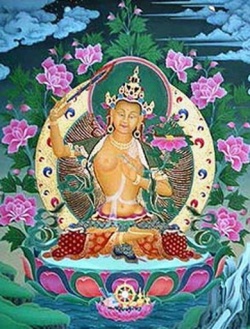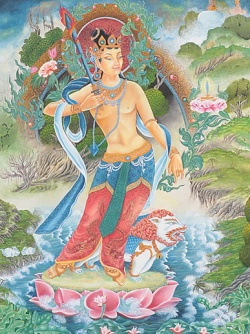Manjughosha
The popular deity ma~njughoSha is from Buddhist pantheon and is also known as Manjushri [some sects distinguish between the two but such details are of no practical interest to us here]. Manjughosha is a Buddhist deity, worshipped as Vagisha to obtain the power of discrimination. He is depicted as 16-year old Bodhisatva. Details of his worship can be found in Sadhanamala, Prajnaparamita Sutra, Manjushri Mula Kalpa, dAkArNava mahAyoginI tantra, kAlachakra tantra, Manjushri Namasangiti, etc. in various forms such as Manjushri, Manjughosha, Guhya Manjughosha, Manjuvajra, Manjuswara etc. Some seem to identify him with the planet Guru which seems ridiculous due to differences in iconography, mythology, mantric structure, application of the mantra etc.
In our own Tantras, we speak of a bhairavAkR^iti named Manjughosha, who seems to be a latter addition to Hindu Tantra. His mantra in most of the medieval Tantric works is a corrupted form of the Buddhist arapachana mantra of Manjushri. While the symbolism of the Buddhist version is explained in great detail by the knowers of the Prajnaparamita Sutra, the Hindu version seems to make no sense. There is a rudra named Manjughosha listed among the hundreds of deities discussed in brhad Badabanala, as a part of Tara Kula but his mantra is not the same mantra discussed in Manjushri Kalpa [the Hindu version], Brhat Tantra Sara of Krishnananda Agama Vagisha and other similar works. It seems to be the lesser known Manjughosha that classic Tantras speak of and not the later form adopted from Buddhism. For example, Manjughosha is one of the Panchangas of shyAmA:
bhairavI tArA chinnamastA hyucChiShTabhojinI |
ma~njughoShaM tathA raudre pa~nchA~NgAneShyate budhaiH ||
The applications of this deity, discussed by medieval texts is mostly shaTkarmas, and sometimes attainment of wealth, speech etc, probably influenced by the Buddhist counterpart again. The rules of upAsanA for this borrowed deity clearly exhibit Buddhist influence:
nAnyadevArchanaM snAnaM praNavocchAraNam na tu |
vastrA~nchalena dantAnAm shodhanam lavaNena vA |
rAtrivAso na mu~ncheta na shuchiH syAt kadAchana ||
"upAsaka, during the purashcharaNa of manjughosha mantra, should not worship other deities [clearly, this is referring to Hindu deities), recite praNava mantra, take bath, wear clean clothes or stay clean bodily".
His dhyAna, described in these medieval texts is as below:
shashadharamivashubhram khaDgapustA~NhapANim
suruchiramatishAntam pa~nchachUDam kumAram |
pR^ithutaravaramukhyam padmapatrAyatAkSham
kumatidahanadakSham ma~njughoShaM namAmi ||
The description is also similar to the Buddhist iconography, where Manjushri is described as holding a flaming sword in the right hand, and a book in the left [aShTasAhasrikA Prajnaparamita Sutra). He is seated on a lotus, elephant or lion, again borrowed in the Hindu version.
The dhyAna of the attendant of Rudra, discussed in Brhad baDabAnala, is drastically different but I do not have access to this work currently.
Anyway, both these Manjughoshas are male and the female manjoghoShA seems to be the popular yakShiNi with a sweet voice, who can only be mastered after attaining the Siddhi of ghaNTA yakshiNi.
As for the upAsanA of the Hindu-borrowed-Buddhist form of the deity, many have reported quick results [surprisingly as the mantra, though corrupted, does seem to grant results] but followed by extreme misery. An acquaintance in Chennai was initiated into this mantra by someone during his long stay in Chattisgarh and I was witness to a certain ceremony related to this deity. I am unsure if the practice went bad or the deity himself is not someone to be approached as the three of us began to feel suffocated after a while and feel a ghoulish entity present there. And again, with a natural impulse, Lord Nrhari was called for help to clear the negative energy. The gentleman attained paraloka within a month.
vinA yasya dhyAnam vrajati pashutAm sUkaramukhAm
vinA yasya j~nAnam janimR^itibhayaM yAti janatA |
vinA yasya smR^ityA kR^imishatajaniM yAti sa vibhuH
sharaNyo lokesho mama bhavatu kR^iShNo.akShiviShayaH ||
hare kR^iShNa

